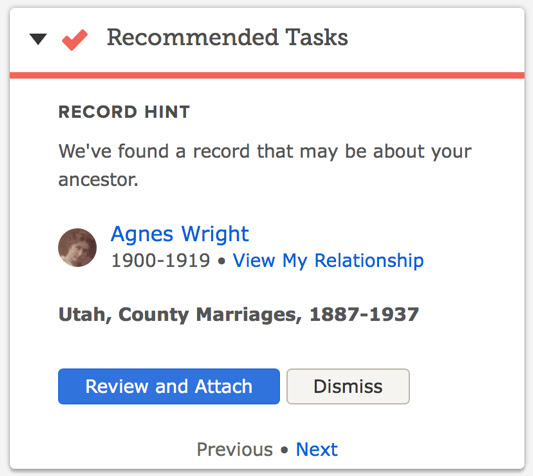Salt Lake City, Utah (29 September 2016)--You might discover new ancestors on your family tree this week at FamilySearch.org.
The nonprofit FamilySearch International, the largest genealogical organization in the world, released 141 million new hints in its online Family Tree today. The hints make use of the newest additions to FamilySearch’s massive collections of worldwide historical records made searchable online by volunteer indexers. These hints can lead to exciting new family history discoveries.
Two years ago, FamilySearch.org’s search engine began creating the hints by comparing data from the five billion names in its historical records online to the 1.2 billion customer-contributed ancestry names in the online Family Tree. “When we put the data together for comparison and find high-scoring matches to people in your family tree, that’s what we call a hint,” explained Robert Kehrer, FamilySearch senior product manager.

“In essence, the FamilySearch.org search engine is constantly working to make research discoveries for you without your having to do much more than login, validate what it found, and accept the hints,” added Kehrer.
The current addition enlarges the already published 1.5 billion hints from historical records in FamilySearch Family Tree. These hints can help in your research. Instead of searching for each ancestor separately, you receive the information in the form of a hint after FamilySearch has already searched the records for you.
These hints can identify a possible ancestor to add to your individual tree, or they can provide rich additional sources for an ancestor already in your tree. The details from one historical record may lead to the discovery of another, and the added details of each ancestor’s life can help weave together your family’s story.
Kehrer said he is confident of the hints’ accuracy because the historical records are being compared to all the rich information surrounding the ancestors in your family tree. In fact, the results have been verified at a 98.5 percent average accuracy. An exception can occur, for example, if your ancestor has a common name and not much differentiating information is attached to him or her. “If your ancestor is named John Smith and was born in New York in 1920 and there aren’t many people associated with that ancestor, the accuracy won’t be that high,” he said.
 These
newest hints in the historical records arsenal come from many
countries, but particularly noteworthy are the 1851 and 1881 census
records of England and Wales. “A large number of family history buffs
have ancestors from the British Isles and records from this relatively
recent time can be a good way to start or build a family tree,” Kehrer
said.
These
newest hints in the historical records arsenal come from many
countries, but particularly noteworthy are the 1851 and 1881 census
records of England and Wales. “A large number of family history buffs
have ancestors from the British Isles and records from this relatively
recent time can be a good way to start or build a family tree,” Kehrer
said.How do you find your hints?
It’s easy. Sign in to your free FamilySearch.org account. If you don’t have an account, you can obtain a free account by going to FamilySearch.org. The hints, designated by a blue icon, can be located in multiple places, including the main page, the ancestor’s person page, and an ancestor’s entry in the descendancy view of the tree. Click the blue hint icon. If you agree that the record is a match, you can quickly and easily attach the record to that ancestor’s profile in your tree.You may find new hints any time you add a new person to Family Tree or you change the details in an ancestor’s listing. FamilySearch adds historical records daily that are continually mapped to contributors’ ancestors in Family Tree. And just as with today’s announcement, periodically very large batches of new hints are added throughout the year—which means millions of fun, new family discoveries.
Find and share this release online here.
###
About FamilySearchFamilySearch International is the largest genealogy organization in the world. FamilySearch is a nonprofit, volunteer-driven organization sponsored by The Church of Jesus Christ of Latter-day Saints. Millions of people use FamilySearch records, resources, and services to learn more about their family history. To help in this great pursuit, FamilySearch and its predecessors have been actively gathering, preserving, and sharing genealogical records worldwide for over 100 years. Patrons may access FamilySearch services and resources free online at FamilySearch.org or through over 4,921 family history centers in 129 countries, including the main Family History Library in Salt Lake City, Utah.



































